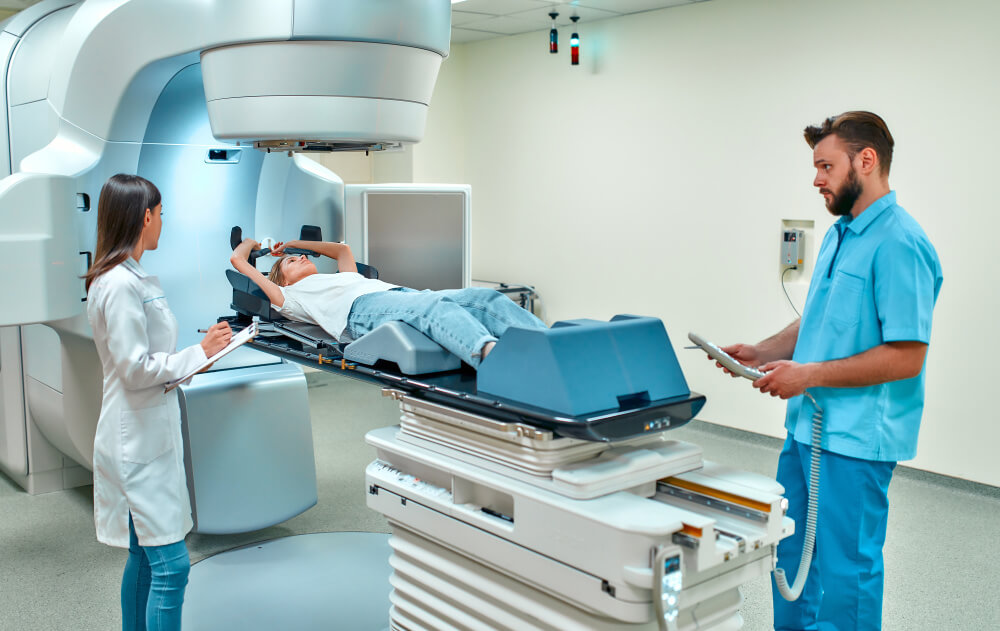Key Takeaways:
- The gastrointestinal complications of radiation therapy vary widely and generally affect the part of the digestive tract receiving the most radiation.
- At many treatment centers, including Dana-Farber Brigham Cancer Center, physicians, nutritionists, and other clinicians work together to help patients manage the gastrointestinal consequences of radiation treatment.
Radiation therapy is used to treat a variety of cancers. High-energy waves or particles directed at tumor cells can damage their DNA, slowing their growth or causing them to die.
Because normal cells in the radiation field can also be damaged, radiation therapy may produce side effects for some patients. These vary with the type and dose of radiation and the part of the body being treated.
The gastrointestinal complications of radiation therapy vary widely and generally affect the part of the digestive tract receiving the most radiation. About half of patients who receive radiation that reaches the digestive tract experience some of these complications. Doctors and clinicians use a variety of techniques to limit radiation exposure in healthy parts of the body and can provide patients with a range of medications to prevent and treat digestive problems.
Some of these effects, such as nausea, can occur soon after a treatment session. Others build up over the course of treatment, as a result of repeated radiation exposure.

How do side effects differ from patient to patient?
Here are some of the side effects associated with radiation to different parts of the digestive tract, and the approaches used to minimize them:
Esophagus: Patients may experience irritation or inflammation that makes swallowing difficult. Sometimes this occurs following radiation to the upper part of the spine to treat a tumor there. The problem usually diminishes within a week or two of the completion of radiation treatment. Patients may be given a medication that numbs the area to make swallowing easier and less painful. Drinks containing aloe may be used to help the esophagus heal.
Stomach: Patients may experience nausea shortly after receiving radiation to this area. Over the course of treatment, they may develop decreased appetite. Nutritionists often work with patients on a dietary strategy that involves small meals spread over time, often including high-calorie snacks.
Bowel: Patients receiving radiation to the lower digestive tract may have cramping and abdominal pain. This is thought to be because radiation can cause the bowel to become swollen, pushing undigested food further into the digestive tract, where bacteria produce more intestinal gas. Treatment may include anti-gas agents or a change in diet to reduce fruits and vegetables and increase simple starches like toast and pasta.
Pelvis: Diarrhea is the most common short-term side effect of radiation to this area. Radiation-associated irritation to the large intestine may prevent it from absorbing water properly, causing food waste to pass through faster than normal. The problem can usually be managed with anti-diarrheal medications and dietary changes that sometimes include more fiber. Some patients experience pain with bowel movements because of skin irritation, which generally diminishes over time. Pain medication is a common remedy.
Patients receiving whole-body radiation for cancers such as chronic myelogenous leukemia, acute myeloid and lymphoblastic leukemia, non-Hodgkin lymphoma, and neuroblastoma may have nausea, which can be treated with medication.
How to get help and relief
At many treatment centers, physicians, nutritionists, and other clinicians work together to help patients manage the gastrointestinal consequences of radiation treatment.
“The patient care team works closely with patients to adjust their diet to minimize potential problems,” says Neil Martin, MD, MPH, clinical director of the Department of Radiation Oncology at Dana-Farber Brigham Cancer Center.
Patients should discuss their plans — whether they hope to work during treatment, for example — with their care team so they know what to expect and how to prepare for potential gastrointestinal issues.
For the small minority of patients for whom gastrointestinal issues become an ongoing problem, doctors and nutritionists may advise keeping a food diary to pinpoint which foods are causing the most adverse effects and to adjust one’s diet accordingly.
